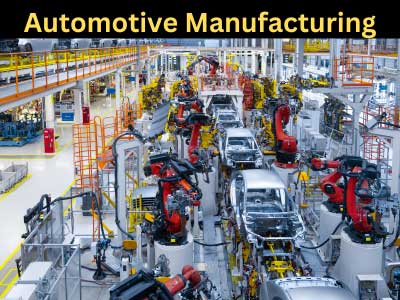What Is The Role Of MES In The Automotive Manufacturing Process?
Key Takeaway
MES plays a crucial role in the automotive manufacturing process by coordinating complex assembly lines. It tracks the progress of vehicles on the assembly line and monitors the availability of components, ensuring that each part is available when needed. This real-time tracking helps prevent delays and keeps the production process running smoothly.
Additionally, MES synchronizes operations across different workstations. By providing real-time data and insights, MES ensures that all workstations are aligned and working efficiently. This synchronization enhances productivity and reduces the likelihood of errors. Overall, MES improves efficiency, maintains production flow, and ensures high-quality output in automotive manufacturing.
Streamlining Production Line Operations
Streamlining production line operations is a key role of MES in automotive manufacturing. MES provides real-time monitoring and control, ensuring efficient and accurate execution of each production step. This oversight minimizes delays and optimizes resource use.
For instance, MES tracks the status of workstations, providing immediate updates on issues or bottlenecks, allowing quick adjustments to maintain smooth operations. By integrating with automated systems, MES ensures adherence to production schedules and uninterrupted workflow.
Additionally, MES supports lean manufacturing by identifying waste and inefficiencies. Continuous monitoring and analysis of production data help streamline operations, reduce cycle times, and improve productivity. This optimization lowers costs and increases output, enhancing competitiveness in the automotive industry.

Enhancing Quality Control
Enhancing quality control is another significant benefit of MES in automotive manufacturing. MES ensures that every component and assembly meets strict quality standards by providing comprehensive monitoring and documentation of the production process. This real-time quality control helps detect and address defects early, preventing faulty products from progressing further down the line.
For instance, MES can integrate with inspection and testing equipment to automatically capture quality data at various stages of production. If a defect is detected, MES can trigger alerts and stop production to allow for immediate investigation and correction. This proactive approach ensures that issues are resolved quickly, reducing the likelihood of rework and recalls.
Additionally, MES supports continuous improvement in quality by analyzing historical quality data to identify trends and root causes of defects. By understanding these patterns, manufacturers can implement corrective actions and process improvements to enhance product quality consistently. This focus on quality control helps automotive manufacturers meet customer expectations and regulatory requirements, protecting their reputation and market position.
Managing Inventory and Supply Chain
Managing inventory and supply chain efficiently is crucial in automotive manufacturing, and MES plays a vital role in this area. MES provides real-time visibility into inventory levels, material consumption, and supply chain activities, enabling manufacturers to optimize inventory management and ensure a steady flow of materials.
For example, MES tracks the movement and usage of raw materials, components, and finished products throughout the production process. This real-time data helps manufacturers maintain accurate inventory records and avoid stockouts or overstock situations. By integrating with enterprise resource planning (ERP) systems, MES ensures that procurement and supply chain processes are synchronized with production needs.
Moreover, MES supports just-in-time (JIT) manufacturing by coordinating the delivery of materials to align with production schedules. This coordination minimizes inventory holding costs and reduces waste, ensuring that materials are available exactly when needed. By managing inventory and supply chain effectively, MES helps automotive manufacturers reduce costs, improve efficiency, and maintain a smooth production flow.
Supporting Just-In-Time Manufacturing
Supporting just-in-time (JIT) manufacturing is another critical function of MES in the automotive industry. JIT manufacturing aims to reduce inventory levels and increase efficiency by producing only what is needed, when it is needed. MES provides the real-time data and control necessary to implement and sustain JIT practices effectively.
For instance, MES monitors production schedules, material availability, and demand forecasts to ensure that production aligns perfectly with market needs. By providing real-time updates on inventory levels and production status, MES enables manufacturers to adjust production plans quickly in response to changing demand. This agility helps minimize inventory costs and reduces the risk of overproduction.
Additionally, MES facilitates the synchronization of production activities with suppliers and logistics providers. By sharing real-time data and forecasts, MES helps ensure that materials and components arrive just in time for production, eliminating delays and excess inventory. Supporting JIT manufacturing with MES leads to more efficient operations, lower costs, and faster response times, enhancing the competitiveness of automotive manufacturers.
Facilitating Traceability and Compliance
Facilitating traceability and compliance is a crucial role of MES in automotive manufacturing. MES provides end-to-end traceability, allowing manufacturers to track every component and process from raw material to finished product. This traceability is essential for ensuring product safety, quality, and regulatory compliance.
For example, MES records detailed information about the origin, batch number, and movement of all materials and components used in production. This comprehensive tracking ensures that any issues can be traced back to their source, enabling quick identification and resolution of problems. In the event of a product recall, MES allows manufacturers to identify and isolate affected batches swiftly, minimizing the impact on consumers and the company.
Moreover, MES supports compliance with industry standards and regulations by providing accurate and complete documentation of the production process. This documentation is essential for audits and inspections, demonstrating adherence to quality standards and regulatory requirements. By facilitating traceability and compliance, MES helps automotive manufacturers ensure product safety, maintain customer trust, and avoid costly fines and recalls.
Conclusion
MES is a powerful tool for the automotive manufacturing process, streamlining production line operations, enhancing quality control, managing inventory and supply chain, supporting just-in-time manufacturing, and facilitating traceability and compliance. For newly joined engineers, understanding the role of MES is crucial for contributing to the efficiency and effectiveness of automotive manufacturing. By leveraging MES, automotive manufacturers can enhance their operational efficiency, ensure product quality, and maintain compliance with stringent regulatory requirements. Embracing MES technology helps create a more responsive, efficient, and compliant automotive manufacturing environment, driving overall industry success.
